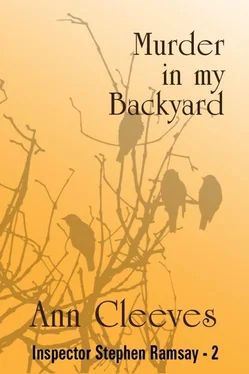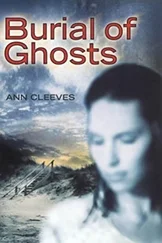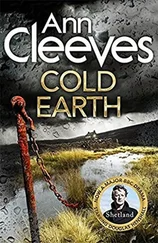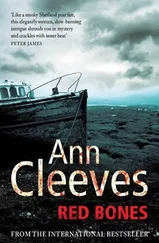Ann Cleeves - Murder in My Backyard
Здесь есть возможность читать онлайн «Ann Cleeves - Murder in My Backyard» весь текст электронной книги совершенно бесплатно (целиком полную версию без сокращений). В некоторых случаях можно слушать аудио, скачать через торрент в формате fb2 и присутствует краткое содержание. Жанр: Детектив, на английском языке. Описание произведения, (предисловие) а так же отзывы посетителей доступны на портале библиотеки ЛибКат.
- Название:Murder in My Backyard
- Автор:
- Жанр:
- Год:неизвестен
- ISBN:нет данных
- Рейтинг книги:5 / 5. Голосов: 1
-
Избранное:Добавить в избранное
- Отзывы:
-
Ваша оценка:
- 100
- 1
- 2
- 3
- 4
- 5
Murder in My Backyard: краткое содержание, описание и аннотация
Предлагаем к чтению аннотацию, описание, краткое содержание или предисловие (зависит от того, что написал сам автор книги «Murder in My Backyard»). Если вы не нашли необходимую информацию о книге — напишите в комментариях, мы постараемся отыскать её.
Murder in My Backyard — читать онлайн бесплатно полную книгу (весь текст) целиком
Ниже представлен текст книги, разбитый по страницам. Система сохранения места последней прочитанной страницы, позволяет с удобством читать онлайн бесплатно книгу «Murder in My Backyard», без необходимости каждый раз заново искать на чём Вы остановились. Поставьте закладку, и сможете в любой момент перейти на страницу, на которой закончили чтение.
Интервал:
Закладка:
“And could Henshaw proceed with the building while the appeal was being heard?”
“Oh, no!” The officer seemed almost offended at the notion. “ It would mean another delay.”
“What would it take to persuade the council to appeal to the high court?” Ramsay asked.
The officer shrugged. “A widespread press campaign. A number of well-attended meetings, a petition, noise, demonstrations.” He gave a little smile. “ There are county council elections in May,” he said. “I think the councillors would be prepared to listen.”
“How long have the villagers got to persuade the council to appeal?”
“A month,” the officer said. “ They have until the end of the month.”
“I don’t understand,” Ramsay said, “why there wasn’t more fuss when the plans were originally proposed.”
“Well I believe there was some confusion in the community about the exact nature of the development. And, of course, there are people who don’t bother to read the planning notices in the local paper.”
“Is Henshaw involved in other developments in the county?”
“Oh, yes,” the officer said. “There have been half a dozen applications in the past two years.”
“Have most of them been successful?”
“Yes,” the officer said. “ I believe five out of six were allowed. The most recently completed was at Wytham.”
“Henshaw built those, did he?”
Ramsay drove through Wytham on his way from Heppleburn to Otterbridge and had seen the buildings grow. The estate was surrounded by a stone wall with pillars, which made him think of a decorative prison. Each house had a mock-Victorian conservatory. They had seemed to him ridiculously expensive, but all had been sold.
“Is that sort of success rate usual?” he asked.
The officer paused. “ There may have been a couple of surprising decisions,” he said, “but Henshaw is very clever, you know. His developments are relatively small and not designed to upset existing communities, so it’s hard for objectors to get the level of support they need.”
“You never suspected corruption?” Ramsay asked. “ Henshaw doesn’t have any special friends on the planning committee?”
“Oh, no,” the officer said. “ There’s never been any question of that sort of dishonesty.”
But Ramsay would have believed anything of Henshaw, and the planning officer was a loyal civil servant. He would hardly pass on rumours of fraud. Ramsay needed other, less partial information.
The council offices were stuffy, overheated, with waves of warm air from the open doors into the corridor where Ramsay was walking, and he reached the street with relief. Outside it was still cold and grey. There had been an inch of snow overnight and in the market square people stood in groups and talked about the weather. He collected his car from the police station, then was stuck for twenty minutes in crawling traffic.
When at last he was out of the town, he drove first not to Brinkbonnie but to Heppleburn. When he had worked on an enquiry in Heppleburn he had met Jack Robson, a county councillor, and it occurred to him now that Jack might be willing to help with information about Henshaw. Jack would have no affection for land speculators and Ramsay was convinced of his integrity.
Robson lived in a small estate in 1930s council houses. The move to smokeless fuel had not yet reached the village and clouds of smoke hung over the chimneys. There were neat paths through the snow cleared from the pavements to the front doors. Two elderly women in long coats and furry ankle boots gossiped on the corner. As he drove past they looked at him, wondering who he was. Whenever he came to this estate Ramsay had the impression of going back in time. It was preserved in an atmosphere of fifties’ boredom and decency.
Through the living-room window of Robson’s house Ramsay saw the old man sitting by the fire. He was eating an early lunch. His feet were straight ahead of him on the hearth; there was a book on his knee and a plate of bread and cheese on the arm of the chair.
When Robson opened the door to the policeman, he was brushing crumbs of bread from the front of his jersey.
“Inspector Ramsay!” he said. He seemed more pleased to see the policeman than he ever had in the earlier investigation. “Why, man, it’s good to see you. Come in, come in. I’ll put the kettle on. Or perhaps you’d rather have a beer.”
Ramsay was touched by the welcome. It was not that Robson was lonely and needed visitors whoever they were. He was a busy man.
“Sit here,” he said. “ By the fire.”
Ramsay allowed himself to be brought tea. He refused the offer of food.
“Now,” Robson said. “ What can I do for you? You’re not just here to say hello. Do you need any help with moving into the cottage?”
“No,” Ramsay said. “It’s not that. I’m here for information. Does the name Colin Henshaw mean anything to you?”
Robson looked at him carefully. “Aye,” he said. “ You know he owns that land behind you?”
“Yes,” Ramsay said. “ So I understand. But it’s not about that. Not directly. He lives in Brinkbonnie.”
“That’s where Alice Parry lived,” Robson said. “You’re working on that case?”
Ramsay nodded.
“I knew her,” Robson said. “Through the council, you know. She was a great one for charity projects. I liked her.”
“She sold some land to Henshaw,” Ramsay said, “on the understanding that it would be used for cheap starter homes for local people. When the plans were drawn up, she discovered that he meant to build bigger, more expensive houses there.”
“That sounds the sort of trick Henshaw would play,” Robson said.
“Alice Parry was leading the campaign against the development,” Ramsay said. “There was a protest meeting in the village on Saturday afternoon and on Saturday night she was killed.”
“Henshaw’s a powerful man,” Robson said doubtfully. “He can get his own way without violence. At least he can these days.”
“What do you mean?”
“Well,” Robson said. “ You’ll have checked his record. I don’t know whether he was ever convicted, but when he first started out he had a bit of a reputation as a hard man.”
“No,” Ramsay said. “He was never convicted.”
“He must have been a clever bugger even then,” Robson said.
“As he’s not got a record,” Ramsay said, “ you’ll have to tell me what he got up to.”
“He always liked a fight,” Robson said. “So I understand. I never knew him then. He was still operating out of Newcastle. The story goes that he hired himself out to local businessmen who wanted to collect debts without the trouble of going through the courts. He was a big man. If he turned up on your doorstep, you’d soon pay up.”
“How did he start up in legitimate business?”
“He bought in to an existing building firm,” Robson said. “ George Saunders and he were partners for a while, but Henshaw was soon running the business single-handed. Saunders was too much of a gentleman to survive against him.”
“You say Henshaw’s a powerful man,” Ramsay said. “Has he any influence over the planning committee? I understand he has an unusual success rate with his applications.”
Robson did not answer immediately. He chose his words carefully. “I don’t know,” he said. “I wouldn’t have said so. I wouldn’t put it past most of them, and it is surprising how he’s managed to push his plans through the system, but in most of the cases the plans were rejected by the council and only approved on appeal by the inspector.”
“I suppose,” Ramsay said, “that the Department of the Environment inspector is incorruptible.”
“I don’t know about that,” Robson said, “but I wouldn’t have thought Henshaw would have had any influence there.”
Читать дальшеИнтервал:
Закладка:
Похожие книги на «Murder in My Backyard»
Представляем Вашему вниманию похожие книги на «Murder in My Backyard» списком для выбора. Мы отобрали схожую по названию и смыслу литературу в надежде предоставить читателям больше вариантов отыскать новые, интересные, ещё непрочитанные произведения.
Обсуждение, отзывы о книге «Murder in My Backyard» и просто собственные мнения читателей. Оставьте ваши комментарии, напишите, что Вы думаете о произведении, его смысле или главных героях. Укажите что конкретно понравилось, а что нет, и почему Вы так считаете.












